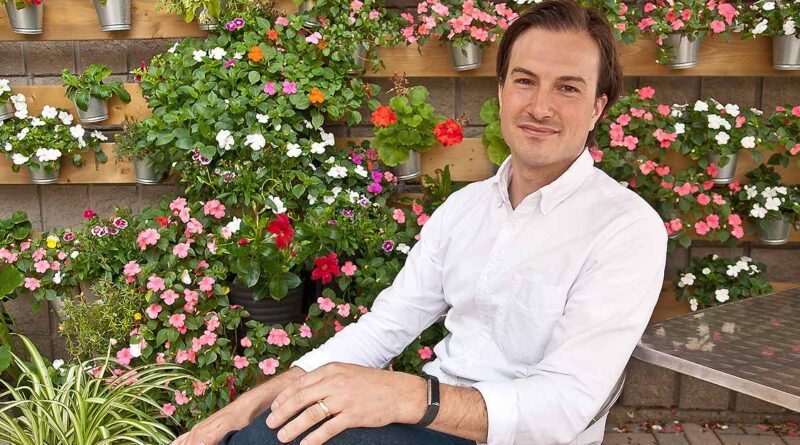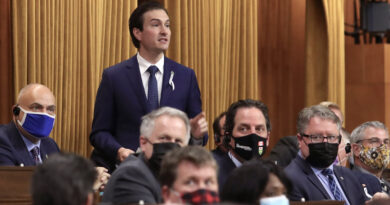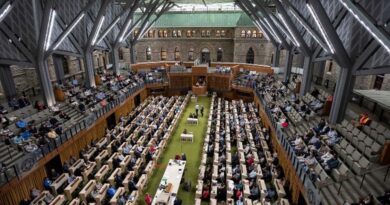Adam Chambers: Heir Apparent?
SUNonline/Orillia profiles candidates from each party in the forthcoming federal election.
CORRECTED
By John Swartz
July 25th Adam Chambers became the Conservative Party’s candidate in the Simcoe North riding, defeating a field of 3 other nominees. Three weeks later he’s off to the races for the September 20 federal election.
SUNonline/Orillia conducted a lengthy interview with topics ranging from issues Canadians have been talking about, to issues Canadians should be talking about. Chambers has deep roots in Simcoe North.
“My mom’s side of the family moved here, in our area, one of the Drummond Island immigrations, so mid 1800s.” Chambers, wife Jane, and his two children (1 and 2 ½-years-old) call Midland home.
“It’s a young family and an exciting time,” Chambers said.
Currently he is assistant vice-president of Canada Life and a member of the Waypoint Centre for Mental Health Care board of directors. He went to the University of Western Ontario, graduating with degrees in law and business, but interrupted his studies to work for Canada’s minister of finance, Jim Flaherty.
“I actually worked for him two different times, four years in total. The first time I was in his office I was his executive assistant/personal secretary type role. That was during the great recession, the financial crisis. It was a very intense time to be there, but very interesting. I was a student at the time. I was in law school. I had taken two years off work for Jim. I learned a lot. He was an incredible mentor to me, as was his wife, Christine Elliott (Ontario deputy premier) has also remained a very good mentor as well. I was very fortunate, and lucky, frankly,” Chambers said.
“I then practiced law for a bit and returned to work for Minister Flaherty as his director of policy. That was helping with his last budget. That was in 2014. When I did practice law, I articled and practiced at a firm in Toronto. After leaving Jim in 2014, for the last 7 years I’ve been working at a large financial services company. I’m not in the legal department there, so I haven’t practiced law for 8 years probably now.”
Chambers began his affiliation with the Conservative Party while at Western.
“I’ve always been civic minded. I got interested in more of the partisan type politics when I went to university. My family, we’d always been talking about current issues, maybe not partisan politics, but current events at the dinner table. I’ve always been interested in giving back to the community.”
“One of the things I learned from Minister Flaherty was the value of public service and how fulfilling and rewarding a career can be in terms of serving your community or your neighbours and advocating for them on their behalf. I did really admire that, in particular about Minister Flaherty and his wife Christine and all the other folks in Ottawa I was very lucky to meet when I was working there. A lot of people are very dedicated to trying to improve the country, make it better and I feel like I had something to offer.”
“Of course, Bruce has been an incredible member for us. He’s been an excellent advocate here. I got to see him working in Ottawa firsthand when I was working there. (He’s) very well-liked, effective and he’s leaving fairly, people say, big shoes to fill, although Bruce and I are the same height so our shoe sizes are probably similar. The thing I heard a lot about Bruce during the course of the nomination campaign was he’s very visible, very approachable. I like to think I’m very approachable in that sense and I do have an objective to help people.”
Chambers thinks he can continue the legacy of being a constituency politician as the example has been set.
“I think we’ve been blessed n our area with some very effective representatives at both levels of government, for as long as I can remember. Bruce and Garfield together, Jill’s now doing an excellent job and when you think back Paul DeVillers was also very well-liked and effective, Doug Lewis; I think we’ve had quite an effective constituency representatives at both levels of government,” he said. “If I can follow in some of those good examples, I’d be quite happy.”
What has kept Chambres attached to the Conservative Party?
“In terms of why I stuck with and remained with the party; fiscal responsibility is incredibly important. The other thing Jim taught me in addition to the value of public service is fiscal responsibility is important because if you want to have the resources to deliver on those social serviced that everybody relies on like our healthcare, education, pension plan, these social programs we all like, we have to make sure we are spending smartly everywhere else so we have resources to pay for those things. I think the spending decisions and the choices we are making now are going to affect government’s ability to pay for those things because of the increase of debt and interest costs. Yes, interest rates are very low now, but even if interest rates return to where they were just two years ago we will have substantially increased interest costs on the deficit, which reduces future government’s ability to pay for things like healthcare.”
It’s been a 15 year involvement with the party. Chambers worked on some campaigns in other ridings, but didn’t become involved with Simcoe North until last year. Given the history of the riding, odds are he could be the next MP, which will afford a different kind of opportunity to contribute to the direction of the party. What would he change, what would he keep?
“First I’d say, if you get elected as a member of parliament, you are representing all of the of the constituents of Simcoe North and not just those members of the Conservative Party in Simcoe North, and not just representing the people who vote for you. Politicians have to remember we’re representing the entire community when we are in Ottawa.”
“As far as the party? I think the Conservative Party has an opportunity to present a vision for the next 20 years of what a small C Conservative, or even a big C Conservative vision looks like and not focusing on what conservative discussions or politics and policies were of the last 20 years. I think there’s a real opportunity here for all of the parties to start thinking about visions for the future as opposed to fighting some of the same issues and things we have in the past.”
COVID-19
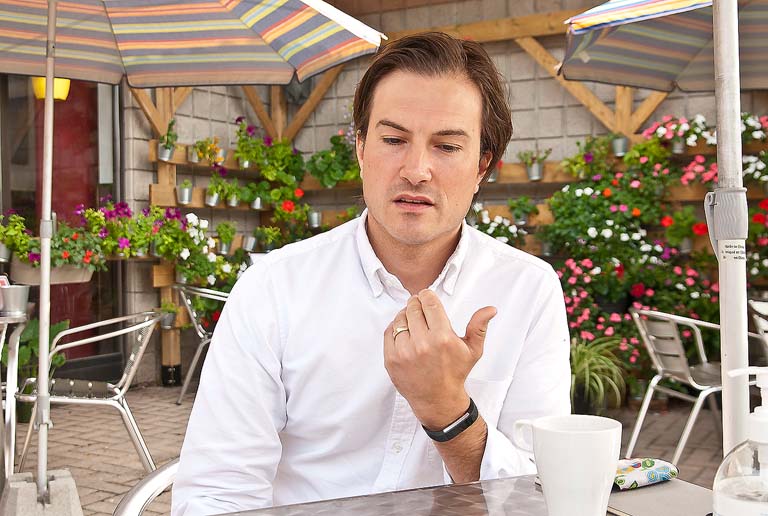
Already the pandemic is front page election news. The past party leader was more of a critic than the current leader of the party. How does Chambers rate the steps the government has taken?
“On vaccines, in terms of our procurement, absolutely we should be proud about our ability to deliver and vaccinate and encourage as many Canadians as possible. I just read recently we’re near the top of the world in terms of those who have been double vaccinated. We should feel great about that.”
“At the same time, we were much later to the party in terms of starting masks, vaccinations and I think we should be really careful before we do a victory lap on beating other countries. Months later starting means, unfortunately there were people who died because we didn’t start soon. And I’m not saying that’s entirely the federal government’s fault, or any government’s fault. The government had initially approached CanSino (Biologics of China) to do a deal, which fell through. We kind of put all our eggs in that basket; we were 6 or 8 weeks behind negotiating with big pharma companies in the U.S., which just put us behind getting the vaccine from other countries. When we had the supply the data shows we were able to get it in arms really quickly, so that’s appositive thing, but we did start a little later. But, you could get double vaccinated in the U.S., like any regular person, months before we were able to. Just think, if were able to do that here we could have probably saved some lives.”
“The fact many Canadians have decided to get vaccinated without mandating it and just asking people to look at the data and do the right thing and talk to a physician I think it’s a good show of civic duty that we’ve had a number of Canadians raise their hand and said, “I’m going to get the vaccine.””
“Now with COVID, the issues post-COVID are going to be way different than what people probably thought their issues were going to be just 5 years ago.”
“We absolutely had to step up and help people during COVID. There’s no question about it. People needed us, the government had to step up. But, I think we have to say, “how do we get people back to work, the economy moving again, how do we reduce the debt we are taking (so) in the future we can pay for these things everybody relies on.””
One of the issues checking several boxes for government attention is vaccine pricing. Earlier this month the government announced it was investing in Moderna’s vaccine manufacturing capacity in Canada. Days later Rueters reported both Pfizer and Moderna had $60 billion in sales of the shots just in 2021 and for 2022. All this after Pfizer and Moderna announced August 1 they were raising prices for the COVID vaccine, causing many Canadians to question how we got to a point where corporations in many sectors receive subsidy investments (which include research grants, tax breaks, and favourable regulation) and then dictate prices to Canadians. To add insult to injury, a couple of Canadian researchers made initial COVID-19 breakthrough discoveries, leading to development of the vaccine. How does Chambers see leveling the playing field for Canadians? Maybe the government should be retaining royalties in exchange for development investment.
“I wouldn’t be able to comment what the negotiations were like for this. I would hope as a smart negotiator the government would consider all the relationships and all of the support it does when it is negotiating with some of these companies,” Chambers said.
“At the same time, these companies who are arguably developing lifesaving technologies and medicines and vaccines, they incur significant costs to do that. I’m not saying they do it all and we didn’t spend anything, but that entrepreneurial, capitalist spirit and drive is what has made modern medicine advance so quickly over time.”
“I think you have to find the right balance between supporting through research and development and what companies feel they can ‘charge.’ Medicine pricing is incredibly complicated across the world. The issue isn’t just related to vaccines. There is a huge challenge, a huge issue in terms of access to medicines, the prices, some countries paying less than others. It’s a very complicate and challenging issue, which will become more as we have an aging population and diseases and ailments and we find more cures or treatments.”
The pandemic also highlighted a lack of preparedness, despite many years of warnings from knowledgeable people. It’s not just the pandemic either. Climate change, resource management, technological advancement/disruption have been topics of discussion among insiders for decades and government only seems to show up after desert is served.
“I think the lesson is, be prepared. It’s pretty simple. Complicated to put into place, but we spend a lot of time doing studies and talking about what people refer to as ‘Black Swan’ events or really rare probability events. We dealt with this in the financial crisis where some very rare low-probability events, but high-impact, actually occurred. The lessons were we need to think more about what these events are and be prepared for these events in a reasonable way.
It sounds like we need a ministry of preparedness, analyzing data in several fields and coming up with contingencies.
“That doesn’t sound like a bad idea. To your point, it’s not just in one area, it could be a bunch of things. There would be a minister responsible for disaster relief and those kinds of things. I think we should be asking it across a number of areas, ‘how can we be more prepared’? How can we help Canadians be more prepared.’?”
Housing
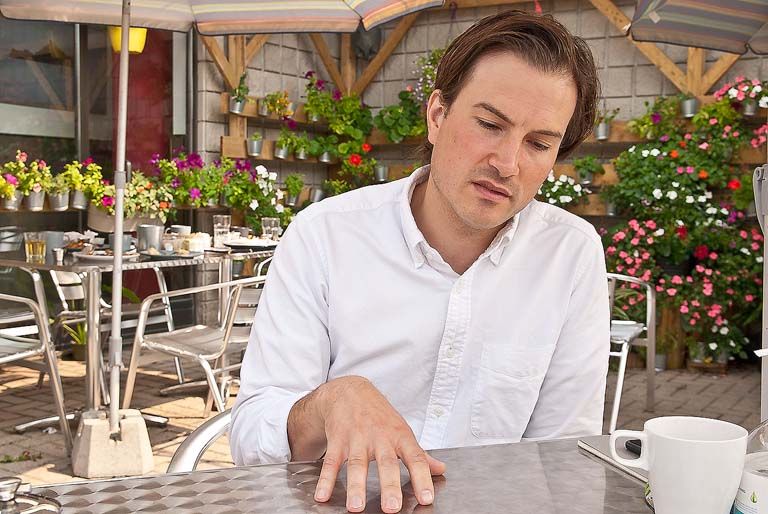
The great recession on 2008 was triggered by a collapse of the U.S. housing market and corrupt banking and trading practices. Canada’s financial oversight and regulation is different than the U.S., but there is no way we can sustain rocketing housing prices, not to mention gouging on construction material costs. What does Chambers think needs to be done?
“I really worry about the long-term and the peaking implications. If you are not in the market today and you are a first time buyer, or maybe you rented for a while, the prices are getting to appoint where it would take somebody 10 or 20 years to save enough for a down payment. Absolutely, we were lucky in 2008/2009. Our banks didn’t take on as much risk. We have a very different system, even since confederation from our first bank act, that was very different from the U.S. It did not favour risk taking as much, did not reward risk taking as much, there were restrictions on bank mergers, a huge oversight body.”
A regulation change and misplaced priorities seem to be where he is heading with his assessment.
“Even in COVID, the wage subsidy, which arguably was a necessary thing for a lot of businesses, to keep people employed, we had no rules. We had multi-national companies that had increases in revenues over the year that were taking the wage subsidy. The wage subsidy is now the largest COVID relief program in terms of spending. It’s well over $111 billion we spent on that. I think 5 to 6 billion have gone to publicly traded companies that arguably didn’t need it.”
“This is the argument. These companies took that money, they kept paying a dividend, they paid executive compensation, or they continued to repurchase their shares. What I find a bit frustrating, if you are in Australia, you can go to the Australian government website and you can see a list of all the recipients. Well, the Canada Revenue Agency has taken that list off the website. You cannot find who has received the support. We have to support people and we had to make sure people stayed on the payroll, but we had no rules and we had some companies and entities that abused those rules. You might say to yourself what else could we have done with that $5 or 6 billion, could we have helped small business more that actually needed it, could we have helped families and individuals more.”
“The most recent budget the government introduced, there’s about $100 billion of new spending over the next three years. There’s not a penny that is allocated to increased healthcare transfers, or long-term care. Everyone’s talking about healthcare and long-term care, if we want to make sure we have the resources there, why are we giving $5 or 6 billion to publicly traded firms? Why couldn’t we have used that money better elsewhere? Or, maybe just saved it for a rainy day?”
Policing
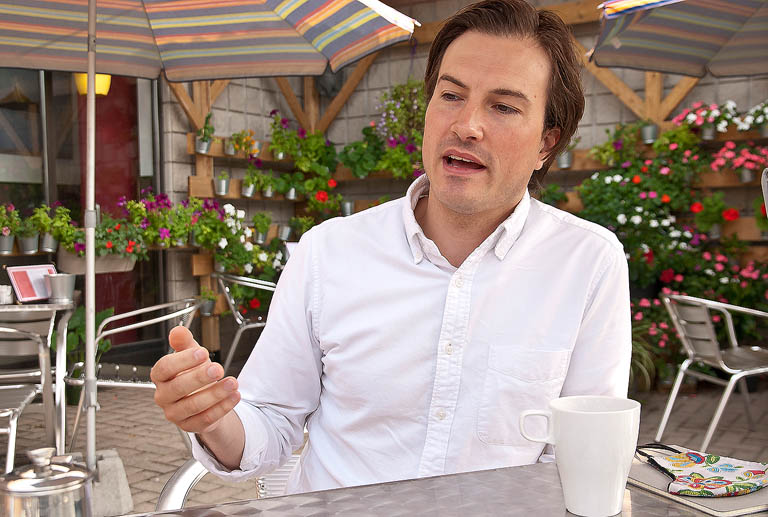
The only tool the federal government has on this matter is the criminal code and funneling money to provinces where the jurisdiction, operation and oversight reside. They also have control over the RCMP, though the force operates under provincial guidelines where they operate. While not the mess it is south of the border, we do have issues with police brutality, and more particularly a lack of consequence for officers who step over the line. It can be argued they get away with things because enforcement of current regulations is not taking place to the satisfaction of the public. Should the federal government make changes to the criminal code and place conditions of grants ensuring police oversight is overhauled and effective?
“I hope that police officer that breaks the law should face the consequences,” Chambers said. “I think we’re blessed here, at least in Simcoe North. We’ve got a world class, top notch service from the police across the riding. I certainly hope anybody who breaks the law feels the consequences.”
“I can’t really speak intelligently to the rest and some of the things that are happening in the rest of the country, other than to say, people who break the law, whether you are a layperson, and executive, or a police officer should all face the consequences.”
“As a country, of course we have some issues we have to deal with, but I’d much prefer living in our country than south of the border when you look at some of the things and challenges they’ve had. “
Healthcare
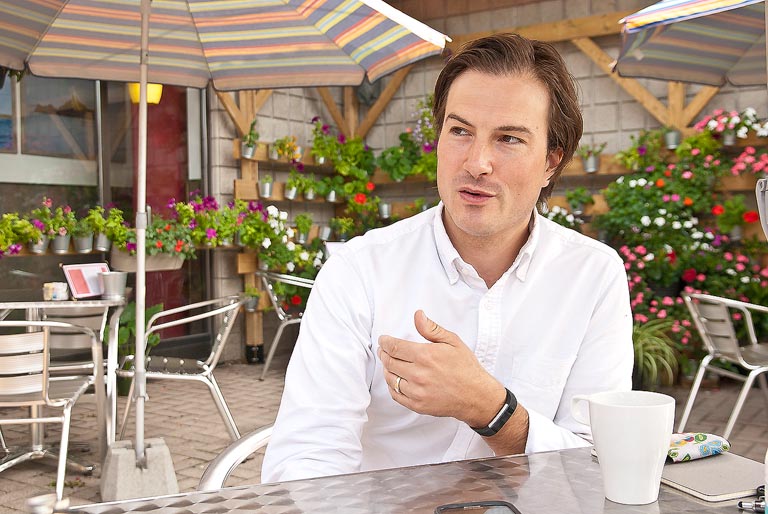
COVID aside, some provinces, Ontario, Alberta, have made attempts to introduce private healthcare, and have privatized many of the support services. In Ontario long-term care has become a disaster since the Harris government allowed greater private ownership of facilities. Many argue dental and eye care should be part of the system as well. What does Chambers think the conservatives should offer to Canadians?
“I haven’t been following the Alberta experience closely. I’ll let the leadership of the party figure out exactly how they are going to talk about healthcare in an election. My personal view would be, look, Canadians as a matter of pride, our healthcare system is incredibly important that people don’t go bankrupt because they have an ailment or need life saving surgery. Maintaining and supporting a healthcare system is obviously a priority and ought to be a priority.”
“The provinces who are at the frontlines of delivering healthcare need to have some flexibility to think – how are we going to do this? How much of a stick can the federal government wield? I’m not sure it can to a significant degree. I‘m not saying it shouldn’t.”
“Realty is, the healthcare costs are skyrocketing, it’s going up substantially. In Ontario it’s eating up at least half the revenues. I think we have to figure out, how do we maintain, how do we support the universal system? I’m looking forward to reading the platform when it comes out. I’ll tell you, Prime Minister Trudeau ran in the 2015 election campaign saying Stephan Harper and the conservative government underfunded healthcare, and yet the healthcare transfers from Prime Minister Trudeau and his government have been the same as what Harper was doing. I’m not really sure that was the most honest proposal for Canadians at the time because it basically took the healthcare funding formula Harper put in place and extended it. This isn’t just a Conservative or a Liberal or even NDP, this is a cross partisan issue, we have to figure out how to deal with increasing costs and at the same time keeping it universal and accessible.”
“We have to make some difficult choices elsewhere to make sure we have the resources to pay for that. This is exactly why having a strong voice in Ottawa that’s going to talk about sensible policies to make sure we can continue to fund the things everybody relies on; people knew the population is aging, but to think the federal government is spending $100 billion a year over the next three years extra and not a penny is allocated to healthcare – you kind of think, what are the priorities?”
Abortion
SUNonline keeps this topic in play because some conservative backbenchers, and minor parties, refuse to let this issue go, despite party leadership saying they won’t make it n issue. Indeed the word does not make an appearance in the just released election platform, Yet, two weeks ago, out of the blue the prime minister made it a front page story. Where does Chambers stand on the issue?
“As I said at the very beginning, I’m incredibly interested in developing a vision for the country for the next 20 years and not focusing on issues from 20 or 30 years ago. As a country and as a party we have a compelling case to make when conservatives focus on the economy, on taxes, on life affordability, on provincial rights and freedoms and giving provinces the resources to run their provinces.”
So, he’s against banning abortion?
“Yeah. I would love to see greater supports for the family, greater supports for single mothers, and greater supports for those adopting children. I think that’s really important. I’d love to see more support for women and pregnancy crisis centers, but in terms of changing the criminal code, I think we’re past that point.”
Climate Change
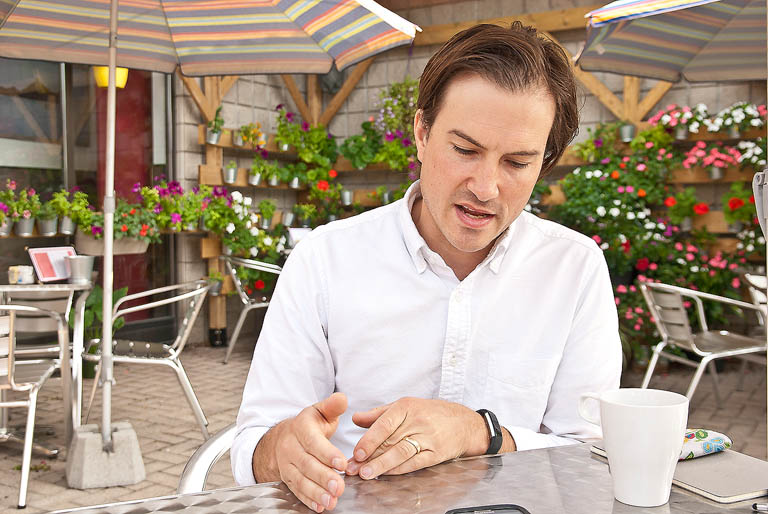
It took a lot of teeth pulling, but party leadership finally acknowledged climate change is a thing. There are 5 of 83 pages dealing with policy on this issue. What most Canadians will hear about is the renaming of the Carbon Tax to the Personal Low Carbon Savings Account and changing how it functions. The party is proposing throwing lots of money into various programs to get industry to clean up, but is it enough? Is it too late?
“Simcoe North is one of the most ecologically diverse areas in the country; Great Lakes, Canadian Shield, farmland, wetland, when you think about what we have here it’s important to protect and conserve the environment. Where the party is, it’s been a long road to getting people’s heads around what that looks, like. My personal view is there are a ton of things that we need to be doing more of, conservation, protecting wetlands, smart kinds of development, protecting clean water. To me it isn’t just about a carbon tax or nothing. A carbon tax is one thing on a whole list of other environmental things we should be talking about and not just fighting about whether a carbon tax is the right thing or not because there is pollution, the use of plastics, we need to be talking about a bunch of things to protect the environment, not just the carbon tax.”
“I’m looking forward to seeing more of the details Erin has put forward about a positive plan for the environment. As conservatives, the root word is conserve and that’s important. I’m absolutely looking forward to having a climate and environmental policy that is positive and forward looking and is going to achieve the things we have said.”
Work/UBI
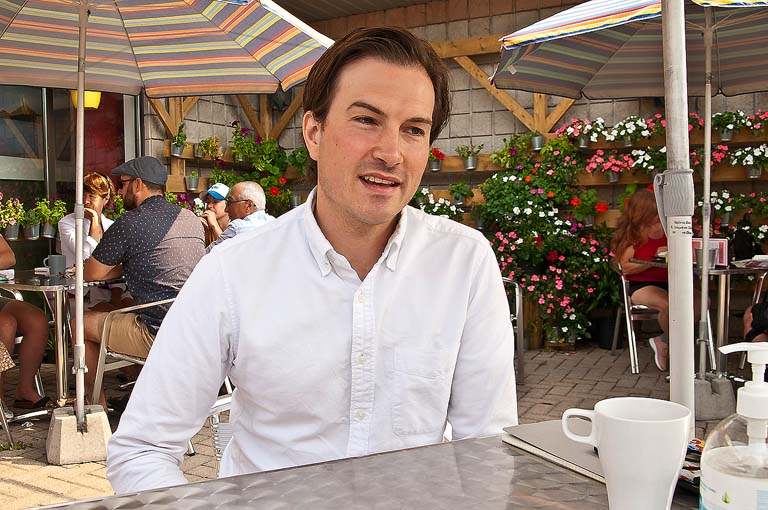
Two things which seem to escape consideration for any of the parties are, first, recognition technological change is going to throw thousands, if not millions, out of work. Experts say transportation automation alone will throw millions out of work. The stop gap jobs to finding a new career are also being automated, so that is not an option. What will people do, what can the country do with unemployment on a scale we can’t even talk about?
“I think automation is going to touch every part of the economy. Yes, driverless trucks, but there’s also other white collar jobs that are going to be displaced as well. The opportunity for us, particularly in Simcoe North in proximity to Georgian College and Lakehead University, the opportunity will be in skilled trades. You cannot automate a lot of the work that is in skilled trades; you need an electrician to show up, you need a plumber. How do we support people to reskill or upskill training, or to encourage our young people to be interested in those kinds of careers in trade, which can offer a significant quality of life, especially for people who like to own their own business, or make their r own hours. I think the skilled trades represent a huge opportunity to combat and/or mitigate the effects of what automation will have on some parts of the economy.”
That doesn’t solve the entire looming problem. It assumes we will build and fix or repair our way out of massive unemployment. Universal Basic Income is a concept few understand, likening it to unemployment insurance, which it is not, and economists are falling in line with the idea it may come to countries creating such programs because the alternative (lower health and nutrition standards, homelessness, disease increase, crime rates rising, prison costs escalating, etc.) is more costly.
“We definitely need some more studies. I’ve done a lot of reading on it, on both sides of it. Some people say Universal Basic Income means that government will reduce supports in other areas and for some people in say the disabilities community, they kind of worry if you take away some of these other supports. I think we have to be really careful that Universal Basic Income is going to solve all the problems. Let’s look at what’s happening right now with COVID. This is kind of a Universal Basic Income experiment. There’s help wanted signs everywhere.”
“I believe there’s also an inherent dignity in work. People actually like to have a job, to have purpose, to have people depend on them to show up to be part of our community. If you have an ability to work and to be a part of society, great; we’ll help you get the right skills and if there are jobs that are disappearing, sure, that’s where government should step in.”
Second, there is a lack of recognition phasing out fossil fuels does not mean oil patch workers will have no employment, if one considers people will be needed to construct, maintain and operate green energy facilities. This means retraining programs are needed. Everyone but the politicians and oil industry barrons understands we need to phase out fossil fuels sooner than later. Maybe we need a World War II production effort to retrain and ramp up the change.
“I personally don’t subscribe to the theory that the oil production and energy production in Canada should go to zero. If you look at the world’s consumption of oil, it’s not reducing its going up.”
But, shouldn’t Canada be the model for the world in making change?
“We could (be the model for the world), there is going to be a huge technological advancement in this for sure, but we’re going to need oil for a long time. Do we have figure out better ways to do it, more efficient ways to do it? Sure.”
“The other thing we have to figure out is somehow other countries have figured out how to become (green energy producers), you look at the Netherlands and some of these others. I don’t see ads about dirty oil from the Netherlands. They somehow managed to do it in a way that seems, at least the perception is, a responsible way.”
“Canadians actually are very innovative. The oil patch is been getting more efficient. The oil patch is not the boogieman; it provides a lot of well-paying, great jobs. Do I think the goal should be to have the oil sands go to zero production? I don’t think so. I think we need to do it in a way that respects the environment as best we can and has an infrastructure. We need to be promoting Canadian energy in a way that tells the true story. These other countries that are violating human rights and producing and the rest of the world is buying their oil – and all of a sudden Canadian oil is dirty? I’m not ready to give up on the ingenuity and the entrepreneurial spirit of the people in Western Canada who have frankly carried the rest of the country for a number of years. There will be a transition as more renewables come up, how do we use Canadian technology? I don’t think it’s going to be shutting something down to start something else up.”
China
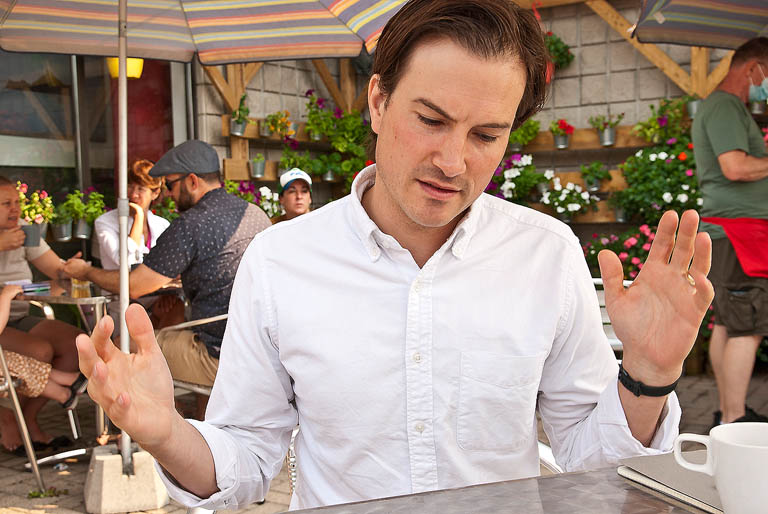
We keep trading with China even though it’s been demonstrated their government supports infiltrating academia (both teachers and student associations) their brutal racial abuses, attempts to subvert our democracy and government, flouting of maritime international law, theft of intellectual property, and a lopsided trade deal (the Foreign Investment Promotion and Protection Agreement) which provides protections and stipulations favouring them which they did not grant to Canada – and they continually break it. Why? is anybody’s guess. It seems the only benefactors are corporate Canada profiting from cheap labour and cheaper in every way goods. We keep showing up in suits and ties to play checkers and they bring boxing gloves and hockey sticks.
It could be argued our continuation of trading with the Chinese government under current conditions is tacit approval of their bad behavior toward us. Does the Conservative Party (which negotiated the trade deal) intend to do anything about it?
“It is clear that the Communist Party of China is not our friend, despite us trying to become friends and getting super close to them over the last number of years. When the Prime Minister took over they wanted to look at a free trade deal with China, which they backed away from. If you look at some of the decisions China has made, at least the party has made, it’s pretty clear they do not see Canada as an ally. They’re holding our two Michaels. They try to extort and exert influence over decisions, but somehow out current government seems to be less confrontational. People who have been involved at these high level diplomatic issues are much more informed than I am. As far as what we see here, we see sometimes unfair competition in Simcoe North.”
“A fundamental of principle of foreign policy, look I wouldn’t be able to comment should we rip it up. We also believe in the rule of law. It’s clear the Communist Party of China doesn’t necessarily always believe in the rule of law. A fundamental principle of international trade is there is this element of reciprocity and if we’re going to give something, we should be getting something in return.”
“I wouldn’t know the intricacies of that agreement or pretend to have an answer, what I can say is at least as far as the people of Simcoe North are concerned, we were once a really massive and influential manufacturing center of not just the area and the province, but of the country. Look at some of the large organizations and manufacturing plants, the footprints we had here, which frankly many have disappeared or at least shrunk considerably,” said Chambers. “This is why giving companies accelerated tax write-offs for new equipment, and we did this in the great recession and I believe Prime Minister Trudeau has also done this as part of COVID, but there are other things we have other countries can’t offer. Our universal healthcare system is a significant benefit to why you might want to do business here than any other country, you don’t have to cover the same amount of healthcare expenditures. Our very well educated, well-skilled workforce is a huge positive.”
Dumping money into reinventing a manufacturing sector we gave up seems to be missing the advantage China has – low wages and few standards of production. It all seems to boil down to ticket prices on retail shelves.
“Look at the cost of a microwave or the cost of an air conditioner, they’ve come down substantially in price for the consumer, so international trade and the movement of goods is ultimately a good thing. I do think there are challenges associated with changes that happen too quickly, or situations where there isn’t reciprocity in the arrangement where we seem to be giving up more than we are getting in return. But, ultimately free trade and the movement of goods, ultimately drives prices down, helps keep life more affordable for people, I think it’s just a matter of balance in terms how do we make sure we’re negotiating and getting the right things in return for what we give up.”
The Internet, Media And Truth
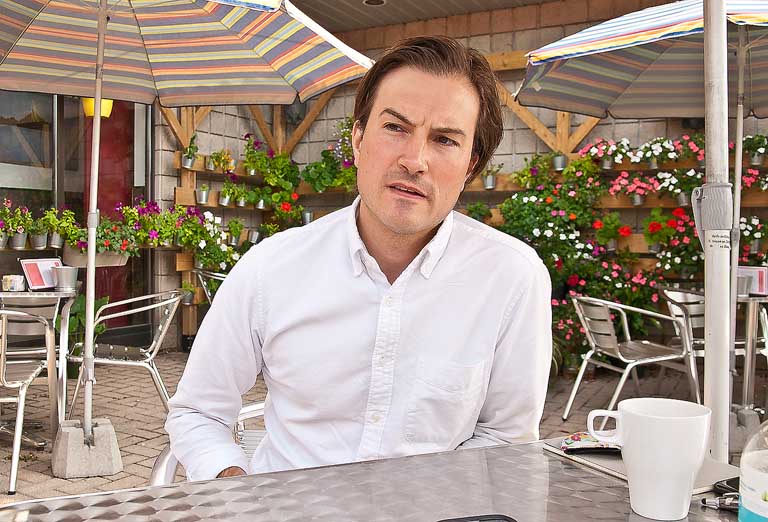
The biggest challenge to democracy and our way of life is limiting the spread of lies shaping public discourse. Regardless of whether it’s garbage on Facebook, blatantly making things up in media, or sloppy journalism it’s hard to find fact and truth in order to form an opinion, or even agree on a starting place for discussion.
The internet is not understood by those who make and regulate the internet as evidenced by two failed bills the federal government offered – both of which missed the point of what the public seems to want, and contained provisions they clearly didn’t want, combined with a CRTC which regulates against its intended original mandate of looking out for Canadians to looking out for corporate profits. The obvious target is social media on the internet. It’s not the only aspect of failing modern information dissemination, but we’ll start there.
“That is a challenge. The internet has been transformative, being able to work from home for a lot of people that’s (good). I would say there are extreme elements on both sides of the political spectrum. The right and the left are able to find communities. There are now audiences for some of these things, before it would have been very hard to find other individuals who felt that way.”
“If somebody had an answer to that question I’d really love to hear it. I think everybody can agree what the most egregious examples are of misinformation, or hate. I think where there’s a challenge is in these areas of gray. I worry a little bit of relying on the Twitter’s of the world or the Facebook’s of the world to decide what is or is not appropriate or what is or is not true. Are they really well equipped to do that? I’m’ not sure I trust a privately motivated, for profit entity to determine what is or is not hate speech or hate news.”
What if we had a Crown agency, like the post office, the Canada Council for the Arts, the Canada Mortgage and Housing Corporation or the VIA Rail which had clear and transparent marching orders and parameters of operation most Canadians could support and free of political influence, is that the answer?
“I’d be looking forward to work on these issues when we get to Ottawa. I don’t have an answer for what is or is not an approach. I think everybody recognizes there is a bit of a problem and probably not a consensus on how to solve it. I think we have to be very careful on limiting people’s ability to say what they think.”
We are witnessing a train wreck in slow motion demolishing the American political system and there are elements trying to do the same in Canada. Inaction later than sooner neutralizing the most extreme elements can cause the same kind of paralysis.
“This notion that people’s social media posts can be censored by the government, we have hate speech laws we should enforce those. Do we need to be monitoring what my aunt posts on Facebook? I’m not sure. Is there an issue with misinformation? Yes. Do I know how to fix it, I don’t know. I can tell you moving too fast, the pendulum can swing too far in the other direction and if people think they are being censored that’s also not a good thing. We run the risk of losing the ability to have interesting debates and discussions with our neighbours. Everything isn’t black and white and it doesn’t seem like there’s much room for nuance anymore. I just worried we go a little too far in the other direction and now some government agency is trolling Twitter reading what people think about a particular issue and saying that’s not appropriate and you should take it down. That also would be problematic.”
News media used to have to follow standards (i.e. not make things up) and present facts in a straightforward manner. Somewhere along the line legislation regarding that was changed and the editorial room also now needs to please marketing and accounting, instead being left to do their jobs. Ownership consolidation is also a problem with a handful of entities controlling most of the radio, television and traditional print outlets. Would the Conservative Party do something to restore integrity to news reporting?
“I always chuckle, we’re in the Olympics right now and you see all these large multi-national corporations who are largely protected from competition running ads talking about the virtues of competition,” Chambers said.
“Maybe. I really feel for journalists and those who run these organizations. The transformation that’s been happening has happened so quickly it creates a whole host of challenges. To figure out a model that works that people can remain employed, and then you have all these other organizations that start up that don’t have the same commitments to integrity or fact checking, so the industry is in a tough spot. The pillar of a strong democracy is a free and independent journalism industry.”
“There seems to be a bit of blurring line between reporting and opinion and I think that’s a bit of a challenge, people are losing some trust and confidence in media. I get and respect everybody’s ability or right to have their own opinion, but if I’m holding myself out as a reporter and a fact checker, I don’t know if infusing my opinion into some of those things is the right approach.”
“I think there will be a bit of a pendulum that swings back to just the facts, just the news. I think things will find a balance and work its way out. It’s important we have a strong and independent journalistic industry.”
The Last Word
“I think people want to vote for someone who is going to work hard on their behalf in Ottawa and to serve them here at home. There are a number of issues affecting our area; making sure rural Canada still has a voice in Ottawa, making sure taxes can remain low on small business and families so people can save up and do the things they want to do with their families. We need a strong voice to advocate for us in Ottawa, I hope I can be that. I feel so fortunate to be born here, raised here, raising my family here. We can’t be complacent. It will take a lot of work and effort and I’m hoping to be part of that solution.”
The riding has a long history of voting Conservative with a Liberal holding the seat both provincially and federally one time in the last 100 years. It might seem Chambers has the upper hand to continue the domination, but he’s not getting on that train.
“I think we should be running this election like we are two and three points behind, you can’t take anything for granted. This riding has been not hostile to conservatives over time, but it was well represented by a Liberal MP, Paul DeVillers, from ’93 to 2006, that’s not that long ago. If anyone walks into this election thinking that this is a slam dunk, they haven’t been paying attention. The riding’s changed with more people moving here. This is not a cakewalk. The Liberal candidate (Cynthia Wesley-Esquimaux) is a very well credentialed, impressive woman by all accounts. This isn’t going to be an easy election and we’re going to have to work hard to keep the seat. Bruce was here for 15 or 16 years, did a great job, there’s a lot to live up to. In some ways I’ll be able to do similar things, in other ways I’m a different person.”
(Photos by Swartz – SUNonline/Orillia) Main: Simcoe North Conservative Party of Canada candidate Adam Chambers.
CORRECTION: Adam Chamber’s wife was misidentified as Jill. Her name is Jane.
Support Independent Journalism
Other Candidate Profiles:

